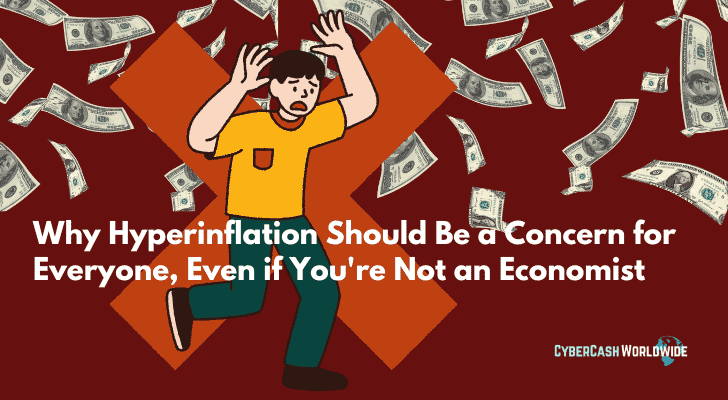Hyperinflation is when prices skyrocket so rapidly and uncontrollably that money becomes practically worthless. You might think this only happens in developing countries but the truth is, it has happened before right here in the United States. So whether you're an economist or not, you'd better understand the risks of hyperinflation for your financial well-being. Keep reading to find out why.

What Exactly is Hyperinflation?
Hyperinflation happens when the prices of goods and services rise at an incredibly fast rate, often daily or weekly. Think of it as inflation on steroids. It’s different from regular inflation, where prices slowly increase over time. With hyperinflation, you might notice your grocery bill doubling within weeks, not years.
How it Shows Up in Everyday Life
You might not realize it, but the cost of living is something you’re already keeping an eye on, even if you don’t pay much attention to the economy. Hyperinflation makes the price of everything shoot up rapidly. Suddenly, what you paid for groceries last month might not even come close to covering the same items today.
- Imagine your usual $100 grocery bill now costing you $200 or more in a short time.
- Gas prices rising so fast that filling up your car once a week starts eating up a huge chunk of your paycheck.
- Rent or mortgage payments skyrocketing while your paycheck stays the same, leaving you with less money for anything else.
Eroding Your Savings
If you’ve been putting money away for the future, hyperinflation eats into your savings, making that nest egg worth less with every passing day. The value of your money decreases so quickly that what you saved for a vacation or a car might only cover a fraction of what you thought it would.
- That $10,000 in savings suddenly can’t buy you what it could a few months ago.
- Prices rise so fast that saving for anything long-term feels impossible.
- Investments might not keep up with inflation, making it harder to stay ahead financially.
Everyday Goods Become Harder to Afford
One of the most immediate effects of hyperinflation is how it affects your ability to buy everyday essentials. Everything from groceries to clothing becomes more expensive at a speed that catches you off guard. Even though your paycheck stays the same, the cost of what you need keeps climbing.
The Cost of Food and Basic Items
The first thing you’re likely to notice during hyperinflation is the steep rise in food prices. Imagine walking into your regular grocery store and seeing that a loaf of bread now costs three times what it did last month. It forces you to make tough choices on what to buy, or worse, what to skip.
- Meat, dairy, and vegetables becoming luxury items you have to cut down on.
- Non-essentials like snacks or drinks might be out of the question altogether.
- Buying in bulk to save money starts feeling impossible as prices keep climbing faster than you can plan.
Gas and Transportation
Another area that hits hard during hyperinflation is the cost of getting around. Gas prices can rise dramatically, and suddenly, your daily commute becomes a financial headache. It’s not just about filling up the tank anymore, but thinking twice about how often you drive.
- Filling your gas tank once a week might double in cost, eating into your budget for other things.
- Public transportation might not stay affordable either, as fares rise to keep up with operating costs.
- Travel plans, whether for work or leisure, start feeling like luxuries you can’t afford.

How Hyperinflation Affects Jobs and Wages
One of the biggest problems during hyperinflation is that wages don’t keep pace with rising prices. While everything around you gets more expensive, your paycheck often stays the same, which means your real income—what your money actually buys—goes down.
Stagnant Wages, Rising Prices
Even if you’re still employed, you’re likely going to feel like your salary just isn’t cutting it anymore. No matter how well your job pays, when hyperinflation kicks in, your purchasing power drops fast. That means your income buys you less, and it becomes harder to cover even the basics.
- Your paycheck feels smaller even though the amount stays the same.
- Raises and bonuses, if you get them, don’t match the pace of rising prices.
- Stretching your money becomes harder as essentials like rent, food, and gas take up more of your earnings.
Job Security and the Workforce
On top of stagnant wages, hyperinflation can impact job security. Businesses face rising costs too, and they might cut back on hiring or even start laying people off to stay afloat. It’s a tough spot to be in if you’re already worried about making ends meet.
- Companies might freeze wages or delay pay raises as they struggle to cope with increasing costs.
- Layoffs become more common as businesses try to cut costs, leading to more competition in the job market.
- Job opportunities might dry up, making it harder to switch careers or find a better-paying position.
Long-Term Effects on Savings and Investments
If you're putting money aside for retirement, a house, or a big purchase, hyperinflation can throw a wrench in those plans. What makes hyperinflation so tricky is that it eats away at the value of your money faster than you might think, even if you're being diligent about saving.
Savings Lose Value Fast
You might have a solid savings plan, but with hyperinflation, the money you put away starts to lose its purchasing power. Even if your account balance looks the same, what that money buys keeps shrinking. It’s frustrating to watch your hard-earned savings evaporate in terms of real-world value.
- A solid emergency fund starts feeling less secure as prices rise and what you’ve saved doesn’t cover as much.
- Long-term goals, like saving for a house or a car, start slipping further out of reach as the cost of everything climbs faster than you can save.
- Inflation-adjusted returns from your investments might not keep up, leaving you with less wealth than you planned for retirement.
Impact on Investments
If you’ve invested in stocks, bonds, or even real estate, hyperinflation changes the game. It creates a volatile market, where assets that once seemed stable suddenly don’t offer the returns you expected. Inflation might outpace the growth of your investments, making it harder to grow wealth over time.
- Real estate prices may skyrocket, but so do property taxes and maintenance costs.
- Stock market volatility can make it difficult to know where to invest or whether to sell.
- Bonds and fixed-income investments often fail to keep up with inflation, meaning your money doesn't grow fast enough.
This hidden knowledge used by the elites will let you generate wealth and prosperity

How Governments Try to Manage Hyperinflation
When hyperinflation hits, governments usually try to intervene, but their actions don’t always make things better. Attempts to control inflation might involve printing more money or introducing stricter policies, but these moves often come with side effects that affect your daily life.
Printing More Money
One common response to hyperinflation is for governments to print more money. On the surface, this might seem like a solution, but it typically makes the problem worse. When more money floods the market without being backed by real economic growth, it dilutes the value of currency even further, driving prices up even faster.
- The cost of everyday goods rises even more because money is worth less and less.
- Savings continue to lose value as inflation spirals out of control.
- Imported goods become unaffordable as foreign currencies remain stable while yours weakens.
Policy Changes
Governments might also introduce strict policies to control prices or wages. While these measures are meant to stabilize the economy, they often create shortages or make it harder for businesses to operate, leading to other problems in the supply chain.
- Price controls might make certain items temporarily cheaper, but stores run out of stock quickly, leading to long lines and rationing.
- Wage freezes keep paychecks stagnant, even as the cost of living continues to rise.
- Shortages of basic goods become common as supply chains break down under the pressure of inflation.
Hyperinflation is one of those things that can catch you off guard if you're not paying attention. It affects everything—your paycheck, your savings, and even how you go about your daily life. Whether you're buying groceries, filling up your gas tank, or thinking about the future, hyperinflation makes it harder to stay ahead financially. Even if you're not an economist, it’s a real-world issue that has the potential to shake up your life in ways you might not expect.
Did You Know You Already Have A LOT To Sell?
So What's Your Problem?

